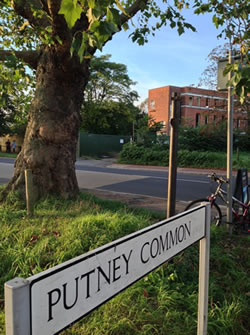Appeal Court dismisses application to block building of access road
The Friends of Putney Common (FoPC) are considering their options after the Court of Appeal dismissed their legal bid to stop the grant of a deed which allows work relating to an access road on the Common to proceed.
The Council would like to build a new primary school on the derelict former hospital site on Putney Common arguing that this is needed to avoid a shortage of places in the future.
The application by Nick Evans, on behalf of the FofPC, a local community group, was heard on 30 June before Lord Justice Kitchin, Lord Justice Rimer and Lord Justice Patten in the Court of Appeal.
In the judgement issued this morning (9th July) the appeal by FofPC against the actions of the Wimbledon and Putney Common Conservators to grant a deed of easement to Wandsworth Council for the construction of an accessway, roundabout, paths, bollards, mounds, streetlighting and a barrier on Putney Lower Common has been dismissed.

Nick Evans of FofPC said, “The High Court and Court of Appeal did not feel able to support the principle that the Common should remain open, unencroached and uninclosed, even though this is clearly what the 1871 Act says. We are very grateful to the many residents who have supported the campaign over the last two years, hundreds of whom contributed generously to our legal costs."
Education spokesman Cllr Kathy Tracey said: “I am delighted that both the High Court and the Court of Appeal have recognised that our proposal for this derelict site is perfectly reasonable and acceptable.
“Our proposals do not involve laying tarmac or concrete over large parts of the common. In fact they will actually lead to the green open space of the common being increased not reduced.
“Only a little over half of the land on which the hospital stands is needed for our scheme. The remaining part of this brownfield site will be grassed over to become green open space for local people to enjoy."
The full text of the Court of Appeal Judgement will be available on the Friends of Putney Common website. The Conservators, who have spent in excess of £50,000 on legal fees this year alone, will now receive an access fee of £350,000 from Wandsworth Council.
FofPC will now consider its legal options, including an Appeal to the Supreme Court. FofPC will also turn its attention to monitoring how the Conservators and the Council manage their development. FofPC intend that supporters who are local residents will contest all five Conservator posts at the forthcoming WPCC election in February 2015.
Nick Evans said, "It will be to the eternal shame of the current Conservators that they were not prepared to fight for the Common that they are elected to protect. They refuse cycle paths on the grounds that they are not 'natural', but allow tarmacked roads and streetlights, when they are offered a pittance by a local authority who threatened compulsory purchase as the alternative."
Lord Justice Patten says in his judgment that the easement will “create additional rights of way over a turning circle which is to be contructed at the northern end of the new road in front of the school. With the exception of a few small areas, the rights of way will therefore be over the Common.”
FofPC believed in this specific case that the 1871 Act did not give the Conservators the power to enter into the proposed deed of easement. The Appeal Court however confirmed an earlier decision of the court (the Housden judgment) which found that Section 8 of the Act confers on the Conservators the power to grant such an easement over the Common in their ownership, and that Sections 34, 35 and 36 which define how the Common should be protected and used for leisure and recreation has no application to the grant of an easement. The Conservators claim that building tarmac roads and ancillary works would not diminish the area of common as open space. The Court accepted that the Conservators decision to grant a deed of easement, including works over never before used areas of the Common, fell within their power to decide what is “necessary or proper”.
FofPC contend that the road access will effectively become the private road system of the school and flats, and effectively will be lost forever. They say the landscaping of the site will be overly intrusive and suburbanise the common, with paths and streetlighting. In his original High Court ruling Mr Justice Wyn Williams had pointed out that much of the proposed access road that was central to the objector’s claim would be built on top of an existing one that had been in place since 1911.
The planning proposal received over 1,200 objections from residents (including from the Conservators themselves), and a considerable number of local people contributed to a crowd-funding campaign to support FofPC’s legal costs, raising over £15,000.
The legal team representing FofPC – Robert McCracken QC and Philip Petchey of FTB – instructed by Caroline Chilvers of Richard Buxton Environmental and Public Law, were unable to persuade the Judge that the new arrangements would neither preserve the common as open space, or be “necessary and proper”.
The FofPC believe that that this represents the 'thin end of the legal wedge' because it establishes a precedent for further encroachment on the Commons in the future.
July 9, 2014